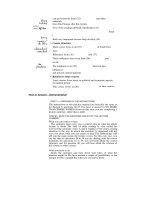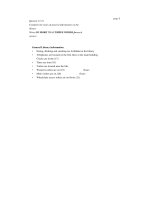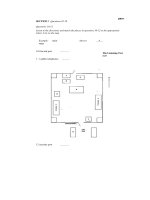Tài liệu Oxford ielts book part 9 doc
Bạn đang xem bản rút gọn của tài liệu. Xem và tải ngay bản đầy đủ của tài liệu tại đây (132.99 KB, 7 trang )
3 Ehcitatian
The candidate is given a task card with some information
on it and is encouraged to take the initiative by asking
questions either to elicit information or to solve a problem
Tasks are based on 'information yap' type activities
4 Speculation and attitudes
The candidate is encouraged to talk about future plans and
the proposed course of study Alternatively, the examiner
may choose to return to a topic raised earlier /
5 ConcluMon
The interview is concluded
Phase 1—Introduction
Phase 1 of the IELTS Test is the introduction You should
• state clearly your name and candidate number into the
microphone for identification purposes
• ask what you should call the examiner if he or she doesn't tell
you
Phase 2—About Yourself
During this stage of the test, the examiner will try to find out as
much as possible about you as a person
REMEMBER
The more information you give at this point, the easier it will be
for
the examiner to hold a conversation, and the more impressed be or
she will be with your fluency Therefore, don't give one word
answers
such as 'yes' or 'no'
Practice
This section is designed to give you a chance to think about the
type of questions
you might get asked in Stage 2 of the Speaking test All the topics
included in these
exercises are likely to be used for questions in this phase of the test
Personal information
The following line represents your life from your birth to now
Put the the most important events in your life on the line
birth
no
w
Think of two questions an examiner might ask about each event,
and write the questions in the space provided
Family and hobbies
Often an examiner will ask you about your family and hobbies as
a way of getting to know you Fill in the following tables so it is
easier to answer this type of question
Family
member
Age Job / School
Point of
Interest
Exampl
e
brother
Things 1 like to dp Things I hate to do
1 1
2 2
3 3
4 4
5 5
Next, try to think of questions that need longer answers, giving
information for each of the activities in your table If, for example,
you write 'I like travelling', possible questions could be as follows
Where is the most interesting place you have been
7
Where would you most like to go'
How did you travel there'
When did you go there'
Why do you like travelling'
With whom do you usually go'
What do you think is the most important thing to take with you,
apart from
your passport and money'
Which country would you most like to live in'
When you have decided on questions for your likes and disjikes,
provide possible answers
/
Your job
Think about the following topics
• the form of transport used to go to work
• your daily routine and responsibilities
• the aspects of your job that you like
• what you dislike about your job
Try to predict the type of conversation you might have with an
examiner
on this subject
\
Your school
Think about the following topics:
• how you get to school
• the size of your school, the numher of pupils
• the subjects you like and dislike
• education in your country compared to the country where you
plan to go.
Anticipate the type of conversation you might have with an
examiner on this subject.
Your home town
You are an information officer at your local tourist bureau.
Prepare a short guide giving places of interest, customs and useful
advice for visitors to the area.
Phase 3—Asking Questions
In tlii: eliutation section the examiner will give you a task card You
have to ask questions based on the card's information to find out
about the situation from the examiner, who is playing a role
The task card the examiner gives you looks something like this
Sample Tusk 1 Booking a Holiday
The examiner has just booked a holiday at the
travel agent.
Find out some information about the holiday.
Find out about
• the destination
• the form of transport
• Ihe length of the holiday
• the dates of the holiday
• the number of people going
• the reason for the holiday
Practic
e
You will have some time to read your task card and then you
should begin asking questions
REMEMBER
you can ask questions other than the ones indicated on the
card
the examiner is playing a role and you should stick to the
topic on the card
• you are being assessed and not the examiner, so you should
do most of the talking
Look at the sample role card and try to think of as many questions
to ask as possible It may help to think of all the 'Wh' words
(including how) and make them into questions relevant to the topic
Then, complete the following interview task
/









